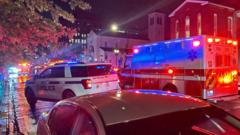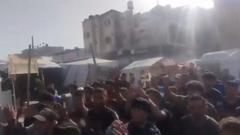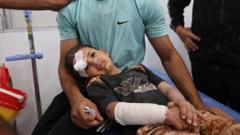The recent shooting of two Israeli Embassy employees outside a Jewish museum in Washington, D.C., underscores the alarming global increase in antisemitic incidents following the Hamas attacks in 2023, revealing a concerning trend in hate crimes worldwide.
Tragedy Strikes: Antisemitic Attack Outside Washington Jewish Museum

Tragedy Strikes: Antisemitic Attack Outside Washington Jewish Museum
A tragic shooting incident outside the Capital Jewish Museum highlights a disturbing rise in antisemitism globally, fueled by recent conflicts.
In a shocking incident on Wednesday, May 21, 2025, two Israeli embassy employees were tragically killed outside the Capital Jewish Museum in Washington, D.C. This act of violence has been described as a harrowing manifestation of the escalating antisemitic sentiments that have surged globally since the onset of the Hamas attacks on October 7, 2023.
According to international hate crime monitors, antisemitic acts—including verbal harassment, vandalism depicting Nazi symbols, and aggressive threats—have seen a dramatic rise, with incidents reportedly doubling or tripling in magnitude since last fall. This trend has persisted amid Israel’s ongoing military operations in Gaza, which have reportedly resulted in extensive civilian casualties.
Experts, including Professor Uriya Shavit from Tel Aviv University, attribute this unprecedented spike in antisemitism to the conflation of heightened political tensions and the humanitarian crisis spawned by the conflict. Shavit emphasizes the complexity of identifying acts of antisemitism against the backdrop of a highly charged global discourse concerning Israel's military actions.
The recent shooting at the museum occurred as the American Jewish Committee hosted a reception for young diplomats, illustrating that while many antisemitic incidents do not reach such violent extremes, significant emotional and ideological tensions continue to manifest in dangerous ways.
This incident raises urgent questions about how society confronts such rising sentiments, as police and university officials grapple with distinguishing between valid political dissent and hate-filled actions. The implications of this shooting resonate beyond the immediate tragedy, calling for heightened awareness and comprehensive strategies to address the increasing dangers faced by Jewish communities globally.
According to international hate crime monitors, antisemitic acts—including verbal harassment, vandalism depicting Nazi symbols, and aggressive threats—have seen a dramatic rise, with incidents reportedly doubling or tripling in magnitude since last fall. This trend has persisted amid Israel’s ongoing military operations in Gaza, which have reportedly resulted in extensive civilian casualties.
Experts, including Professor Uriya Shavit from Tel Aviv University, attribute this unprecedented spike in antisemitism to the conflation of heightened political tensions and the humanitarian crisis spawned by the conflict. Shavit emphasizes the complexity of identifying acts of antisemitism against the backdrop of a highly charged global discourse concerning Israel's military actions.
The recent shooting at the museum occurred as the American Jewish Committee hosted a reception for young diplomats, illustrating that while many antisemitic incidents do not reach such violent extremes, significant emotional and ideological tensions continue to manifest in dangerous ways.
This incident raises urgent questions about how society confronts such rising sentiments, as police and university officials grapple with distinguishing between valid political dissent and hate-filled actions. The implications of this shooting resonate beyond the immediate tragedy, calling for heightened awareness and comprehensive strategies to address the increasing dangers faced by Jewish communities globally.




















